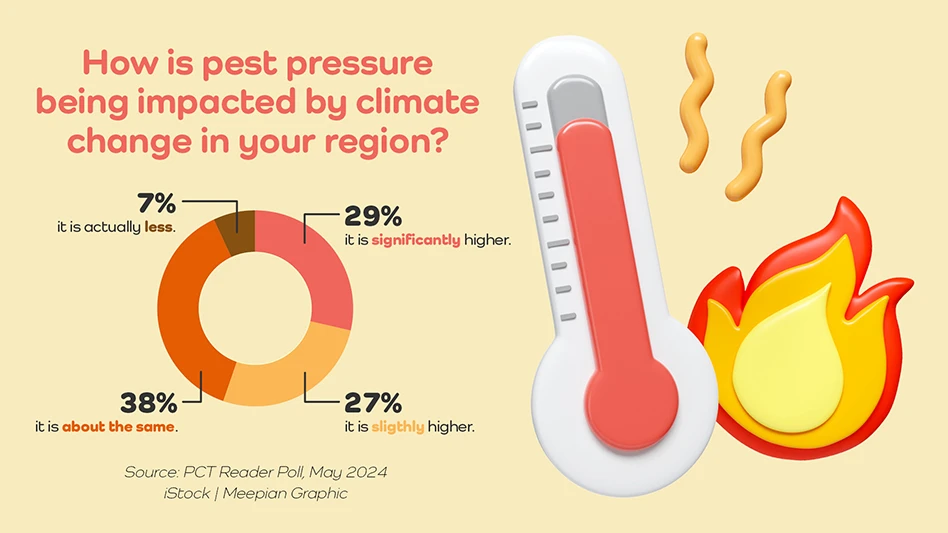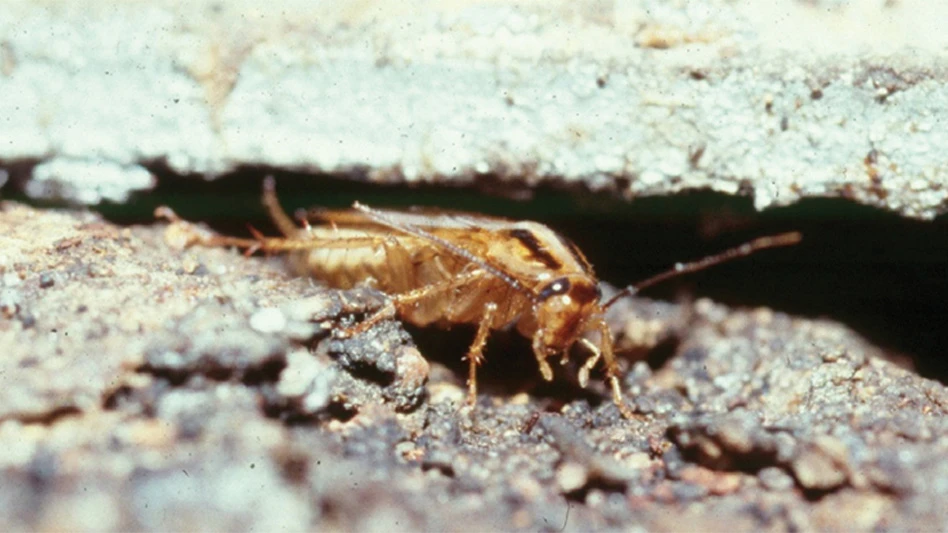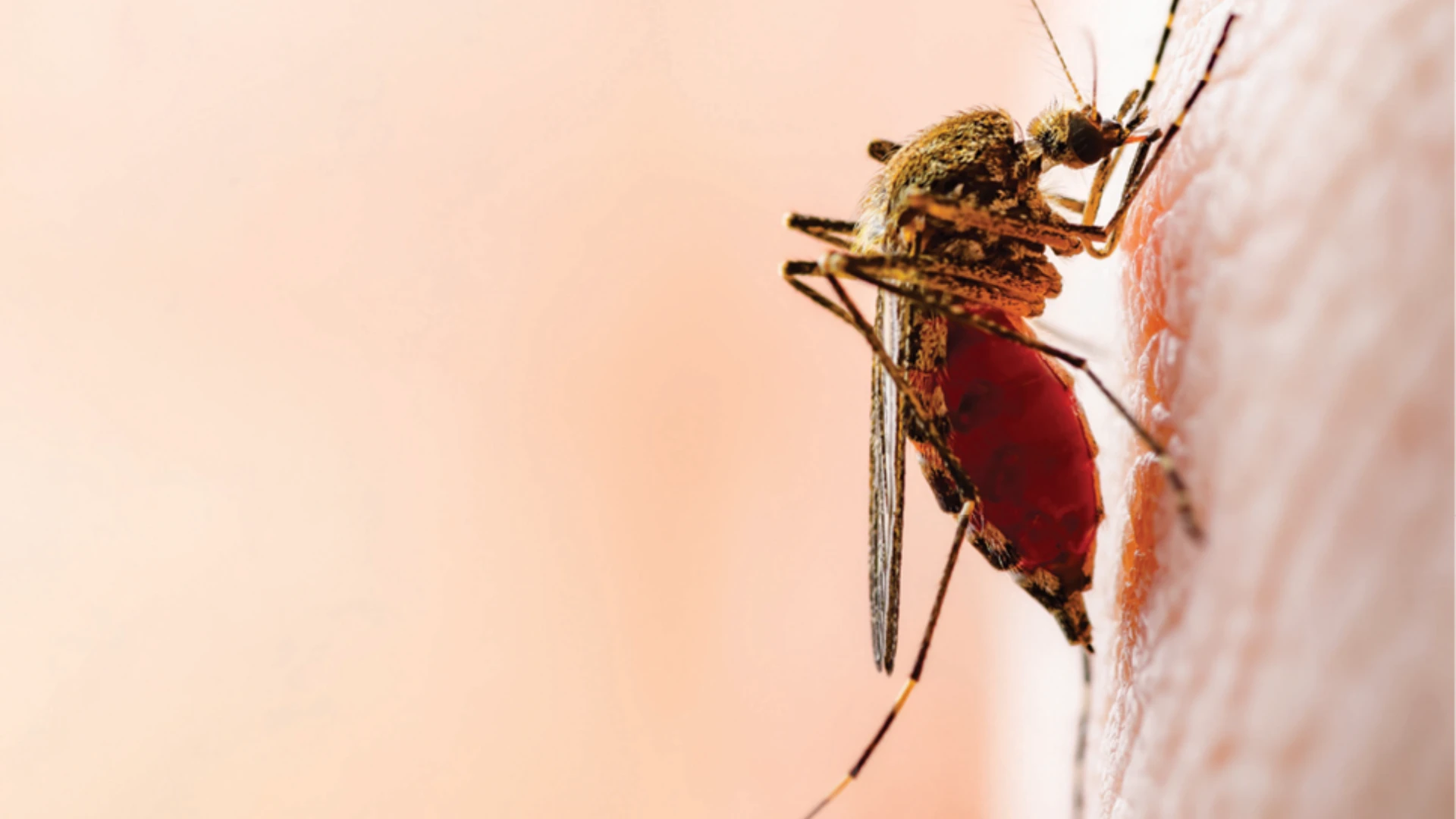
CLEVELAND — Changing temperatures and precipitation patterns have impacted our world in a variety of ways, including pest pressure.
More than half of those who responded to PCT’s recent reader poll said pest pressure is significantly (29 percent) or slightly higher (27 percent) because of climate change; 38 percent said pest pressure is about the same and only 7 percent said it is actually less.
Bob Richardson, entomologist, McCarthy Pest Control, St. Peters, Mo., said a vertebrate pest that is now being encountered in the St. Louis area is the armadillo. Richardson said growing up in southern Missouri he never encountered them. “I guess we can argue all day long about climate change, but it seems like the warmer weather is causing [armadillos] to move into our area,” he said. “We are seeing them dead on the side of the highways more and more.” Richardson said McCarthy will occasionally get phone calls from customers whose lawns are being torn up by armadillos and the company does offer armadillo removal as a service.
Dr. Kathy Heinsohn, B.C.E., technical and training entomologist, American Pest, an Anticimex company, Fulton, Md., said in the DMV (D.C., Maryland, Virginia area) she’s observed more landscape pests surviving winter and doing well. These pests are (inadvertently) brought in on nursery stock from the South for plantings in new suburban yards or around commercial buildings.
“Fire ants, ghost ants, Argentine ants, the now long-present odorous house ants…none or very few of these were found in our areas when I began in 1998,” said Heinsohn, who added that roof rats also are more commonly seen in Baltimore today.
Kevin Hathorne, B.C.E., technical director, Terminix Service, Columbia, S.C., said in the last few years in South Carolina the company has observed pests that are normally found in the lower part of the state moving into other areas of the state. These include Asian cockroaches (Blatella asahinai), which were only found in the low country for many years, now becoming commonplace into the midlands and further north; brown widow spiders (Latrodectus geometricus) moving into the northern part of the state and becoming more common than black widow spiders (Latrodectus mactans) as they outcompete them, Hathorne said.
Hathorne also noted that the Formosan subterranean termite (Coptotermes formosanus) is now being found in counties where they previously were not. “And the golden silk orb weaver spider (Trichonephila clavipes), which is not really a major pest and has been prevalent in the low country for many years, is now being found in the northern parts of the state and even up into North Carolina,” he said.
Hathorne said Terminix Service also has seen an increase in the populations of springtime pests. “Historically, the subfreezing temperatures in the winter months would help reduce surviving populations that emerge in the spring. However, with the absence of the colder temperatures, larger populations of these pests are surviving and emerging in the spring. So, yes, we have definitely experienced noticeable differences and movement of pest populations due to warming temperatures.”
What are possible future implications? Heinsohn said that with warming temperatures all pest life cycles will be increased, meaning, “We may see second and third generations occurring within a summer whereas in the past there may have been only one,” she said. “We are certainly seeing things earlier than in the past. We had clover mites appearing this year in February! Normally for us, they are seen in April or May. You can surmise from this that other mites and ticks may also have sooner-appearing populations.”
Our current poll question asks: Have you seen, or are you expecting to see, cicadas emerge in your region?
Latest from Pest Control Technology
- Liphatech Adds Alex Blahnik to Technical Team
- Do the Right Sting: Stinging Insect Identification, Management, and Safety
- VAGA's 8th Annual Veterans Thanksgiving Appreciation Dinner
- Clark's Blair Smith on the Response to Increased Dengue Fever Cases in Southern California
- WSDA, USDA Announce Eradication of Northern Giant Hornet from U.S.
- Ned’s Home Acquires Ultra Safe Pest Management
- Bed Bugs & Dirty Clothes
- Boston Adopts Liphatech's IGI CO₂ Technology for Rodent Abatement





